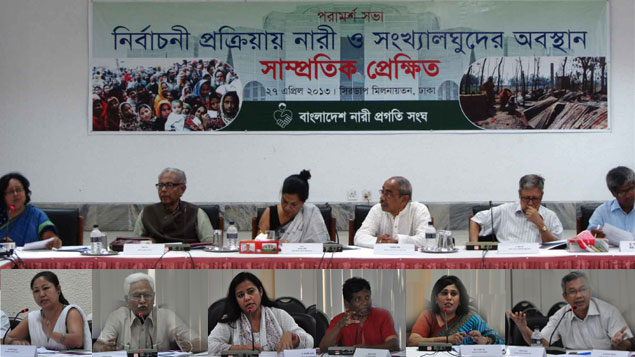
Women activists, ethnic and religious minority leaders and rights activists expressed deep concern on fear-free environment for women and minorities in next general election. In a consultation meeting on “Status of women and minorities in electoral process: Present Context” organized by Bangladesh Nari Progati Sangha on April 27, 2013, the discussants also said that recent attacks on minorities and putting anti-women and anti-secular demands by religious extremist groups are part of the plan to keep women and minorities away from next election.
Recalling the incident of severe violence against women and minorities by religious extremist groups and their allies in 2001 election, discussants said that trend of intimidation and violence of 2001 is clearly recurring for the forthcoming election which will cause reverse effect on women voters’ turnout. Precautionary measures from the government has been claimed to prevent any such incidents.
Moderated by Rokeya Kabir, the consultation meeting was addressed by rights activists and academicians Dr. Ajay Roy, Shariar Kabir, Professor Muntasir Mamun, Dr. Anwar Hossain, Professor Dalem Chandra Barman, Ajay Roy, Dr. Sarwar Ali, Dr. Protima Paul-Majumdar, Dr. Kaberi Gayen, Kajal Debnath, Right to Information Commission member Dr. Sadeka Halim, indigenous rights activists Rabindranath Sowren, Saktipada Tripura, Chaitali Tripura, Canchana Chakma, development and election monitoring professional Sheela Tasnim Haq and others. Dr. Naseem Akhter Hussain, professor, Government and Politics of Jahangirnagar University presented study findings on the women and minorities status on electoral system.
Major recommends and findings of the study include: Amendment of the constitution to allow direct election of women to reserved seats in the parliament, Women of minority, ethnic groups should be included in the list for reserved seats, Legislative decision for political parties to nominate 33% women in general seats, Government can give campaigning finance to the Political parties nominating more woman candidates as incentives, Develop a policy on Gender in the BEC to make the electoral process gender sensitive, Ensure that all state agencies involved in election including police handling electoral violence act neutrally and understand equal rights of woman minority and ethnic marginalized group, Collect sex desegregated data on the electoral process to identify and evaluate gender aspects of the electoral process, The candidature of any candidate involved in acts of hate speech, sexual harassment, violence against women voter/female candidate before during and after election should be cancelled, The voter education materials should be prepared in different languages spoken by ethnic people, The election observation team should include 50% woman observer, Minority groups suggest to introduce15% reserved seats for minority communities which would be directly elected in the parliament.
Participants of the consultation meeting suggested prioritizing the recommendations according to immediate, mid and long term target and also to continue more consultations with specific audience and actors.


